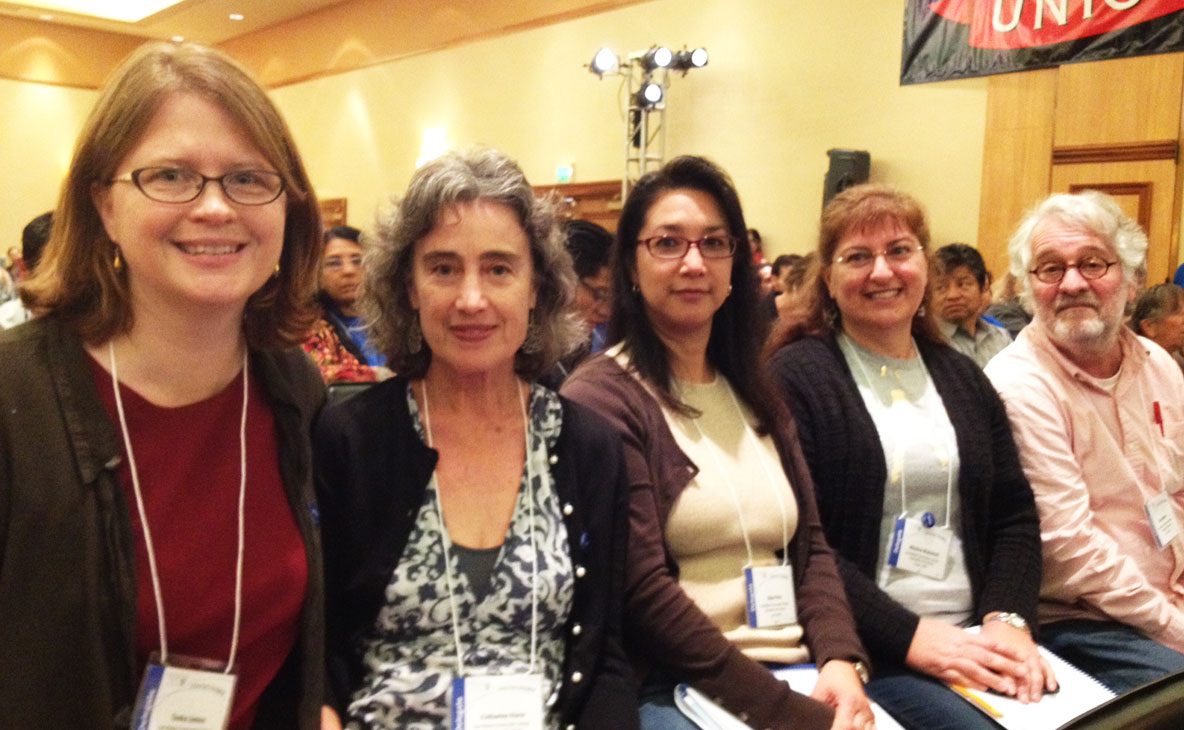“Solution-Driven & Bad Ass”:
A report from the 72nd CFT Statewide Convention
By Katharine Harer, Co-Vice President, AFT 1493
Are conservative forces hell-bent to “Wisconsonize” the rest of the country? Will STRS run out of money for teachers’ pensions? Are the changes in Repeatability Standards taking the community out of community colleges? These are just a few of the questions that kept us glued to our seats at the 72nd California Federation of Teachers Convention. Our Local sent delegates (l. to r. in photo at left) Teeka  James, Katharine Harer, Nina Floro, Monica Malamud, and Executive Secretary, Dan Kaplan, to the statewide gathering from March 21st to 23rd in Manhattan Beach. We joined over 600 participants — teachers, staff and students — to listen to inspirational speakers, attend workshops and reinvigorate our fighting spirit.
James, Katharine Harer, Nina Floro, Monica Malamud, and Executive Secretary, Dan Kaplan, to the statewide gathering from March 21st to 23rd in Manhattan Beach. We joined over 600 participants — teachers, staff and students — to listen to inspirational speakers, attend workshops and reinvigorate our fighting spirit.
“Who else–besides us—will fight for public education” – Randi Weingarten
AFT National President, Randi Weingarten, exhorted the packed auditorium to be “solution-driven and bad ass.” Weingarten zeroed in on the enemies of public education – the forces behind the Vergara case, wealthy interests such as the Koch brothers and David Welsh: “Big money wants to take away our due process, our pensions and our labor power. They want to drive a wedge between communities and teachers. They like an uneven playing field.” Weingarten brought the crowd to their feet when she declared: “They have all the money in the world. We have all the people in the world!”
“A Kid Without An Education is a Crime” – Kamala Harris
California Attorney General and former San Francisco DA, Kamala Harris, fired up the crowd with her focus on education. One of the new initiatives coming out of her office targets the issue of elementary school truancy. According to Harris, some elementary school districts have a truancy rate as high as 40%, and research shows that children who can’t read by the end of third grade drop out by high school. Truancy among children is often closely related to issues of poverty: kids with asthma, dental or vision problems that are often untreated, kids in foster care or in homes where parents are working round-the-clock. Harris declared herself, “the top cop of the biggest state in the country”, and she’s on a mission to improve graduation rates and keep kids in school before they end up “in the ER or jail.”
Harris’ other education-related initiative focuses on reducing recidivism and targets 18-24 year old low-level offenders. As Harris said, “They’re considered adults, but we all know that 18-24 year olds make bad decisions. They need support.” In a project she spearheaded when she served as DA in San Francisco, re-offenses in this age group decreased from 54% to 10%. Now a pilot project she’s directing in Los Angeles focuses on young unmarried fathers. She’s brought the courts, K-12 schools and community colleges together with the larger community to help get the dads on track: job-trained, employed, giving child support to the moms and staying out of jail.
No Se Puede Charters!
A lively panel discussion, Reclaiming the Promise of Public Education, brought together teachers, administrators, parents and community members from three school districts where strategic alliances are being built to defend public education. In Morgan Hill, the teachers’ union, along with the school district, parents and community activists are fighting a charter school corporation that employs enrollment strategies to segregate Latino kids while siphoning funding away from public schools. Theresa Sage, president of the Morgan Hill teachers’ union, shared their story. Working together, they were successful in influencing the local school board to deny the charter corporation government bonds; they organized a petition drive and held a highly successful educational summit to inform the community about the threats to public education from charter schools. Mario Banuelos, a parent and community leader, shared the Morgan Hill rallying cry: No se puede charters!
The Jefferson Elementary school district, just down the road from Skyline, has been working closely to strengthen ties between schools, parents and community. Melinda Dart, president of their teachers union, described a program that started with a series of family education workshops held in the evenings, where parents were asked what they wanted from their schools and the union listened. Building on these relationships, the union packed school board meetings, ran a strong candidate for the board, and put on a wildly successful Saturday conference for families and teachers, with 400 adults and 300 children participating.
Debbie Forward, an organizer for the Palomar Faculty Federation, described a labor alliance she’s helped to build in their community that will create a broad base for local school board elections. Forward said, “We want to identify, vet and endorse real candidates, not lesser of two evil candidates.”
California: the 8th Largest Economy in The World
CFT President Josh Pechthalt, in his State of the Union address, surveyed the good news and the bad news. California, the 8th largest economy in the WORLD, is 51st in the nation in library-to-student ratio and 45th in nurse-to-student. That works out to one nurse to every 2800 kids. But the good news is that a new bill, AB 1955, “Healthy Kids, Healthy Minds” would provide a nurse for every school and a mental health professional, and it would ensure that libraries are open before and after school.
More bad news: the ACCJC is out of control and Brice Harris has failed to stand up to the agency; the Vergara case is costing enormous amounts of money and time to fight and seriously threatens due process; and we desperately need to amend Proposition 13 to protect homeowners and small businesses while forcing big business to pay their fair share of taxes. The good news is that the defense of CCSF has been strong and has garnered positive results; the Fair Property Tax Reform movement is working on legislation that will amend Prop. 13; the oil severance tax campaign is up and running; and the CFT’s Strategic Campaign Initiative/Quality Public Education Campaign organizing grants are “creating and deepening ties” between schools and community partners. A last potentially good news item: the CFT is working on a new model of restorative justice to take the place of suspensions and expulsions as an antidote to the school-to-prison pipeline.
“We Are Born To Be Here Right Now In This Place” – Reverend William J. Barber II
Every single one of the more than 600 people at the convention were held in rapt attention by guest speaker Reverend William J. Barber II, the President of the North Carolina NAACP and the organizer of the Moral Movement. Barber began his speech by stating: “These are serious times. Fifty years after the War on Poverty, now we step on people who are hurting, attacking programs like Medicare, Pell Grants, Headstart and Social Security. That’s pretty low.” Barber has reached out to people across all faiths and backgrounds with his Moral Mondays in North Carolina, protesting huge cuts in education spending and the passage of a voter suppression bill. What began with a few hundred people gathering on Mondays and marching to protect healthcare and voting rights, education, anti-poverty programs and the rights of the LGBT community, has swelled to hundreds of thousands on certain Moral Mondays.
This is Barber: “Any time a mean and extreme element tries to fool Americans into denying education, healthcare and voting rights and then advocates tax cuts for the wealthy and more guns in people’s hands, we got to fight back! We are born to be here right now in this place. We don’t have time to be morbid and depressed.”
And: “Abortion and homosexuality are not the moral debate. How you treat the poor and the sick – that’s the moral question. We’ve got to unpack the moral debate. Bring it on!”
We rose out of our seats over and over to applaud Reverend Barber’s ideas, his commitment and his eloquence as he spoke to us in the rousing tradition of Martin Luther King and the great leaders of the civil rights movement. His definition of morality cuts through pretense and political posturing and goes straight to the heart of social justice: “We are called to deeply moral and deeply constitutional values. Fight back! Push forward!” Reverend William J. Barber II rocked the soul of the 72nd CFT Convention.
AFT 1493 Communication Awards
Last, but not least, our local once again won a number of awards for our publications. In the category of Best Six-or-more Page Newsletter, The Advocate, by Eric Brenner, Editor, won Second Place. In the category of Best News Writing, Katharine Harer won Third Place for her article “Community Building vs. Privatization Highlighted at 71st CFT Convention”. In the category of Best Use of Graphics, Donna Bowman won Third Place for her “Collage Art Panels of AFT Local 1493: 1963-2013”. In the category of Best Single Effort, Donna Bowman and Dan Kaplan won Third Place for their “Collage Art Panels of AFT 1493 History: 1963-2013”.


